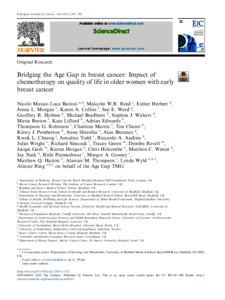BATTISTI, N.M.L., REED, MWR, HERBERT, E., MORGAN, J.L., COLLINS, K.A., WARD, S.E., HOLMES, G.R., BRADBURN, M., WALTERS, S.J., BURTON, Maria, LIFFORD, K., EDWARDS, A., ROBINSON, T.G., MARTIN, C., CHATER, T., PEMBERTON, K.J., SHRESTHA, A., BRENNAN, A., CHEUNG, K.L., TODD, A., AUDISIO, R.A., WRIGHT, J., SIMCOCK, R., GREEN, T., REVELL, D., GATH, J., HORGAN, K., HOLCOMBE, C., WINTER, M.C., NAIK, J., PARMESHWAR, R., GOSNEY, M.A., HATTON, M.Q., THOMPSON, A.M., WYLD, L. and RING, A.
(2021).
Bridging the Age Gap in breast cancer: Impact of chemotherapy on quality of life in older women with early breast cancer.
European Journal of Cancer, 144, 269-280.
[Article]
Documents
27925:565231
![[thumbnail of PIIS0959804920313599.pdf]](https://shura.shu.ac.uk/27925/1.hassmallThumbnailVersion/PIIS0959804920313599.pdf)

Preview
Abstract
© 2020 The Authors Introduction: Older patients with early breast cancer (EBC) derive modest survival benefit from chemotherapy but have increased toxicity risk. Data on the impact of chemotherapy for EBC on quality of life in older patients are limited, but this is a key determinant of treatment acceptance. We aimed to investigate its effect on quality of life in older patients enrolled in the Bridging the Age Gap study. Materials and methods: A prospective, multicentre, observational study of EBC patients ≥70 years old was conducted in 2013–2018 at 56 UK hospitals. Demographics, patient, tumour characteristics, treatments and adverse events were recorded. Quality of life was assessed using the European Organisation for Research and Treatment of Cancer Quality-of-Life Questionnaires (EORTC-QLQ) C30, BR23 and ELD 15 plus the Euroqol-5D (eq-5d) over 24 months and analysed at each time point using baseline adjusted linear regression analysis and propensity score-matching. Results: Three thousand and four hundred sixteen patients were enrolled in the study; 1520 patients undergoing surgery and who had high-risk EBC were included in this analysis. 376/1520 (24.7%) received chemotherapy. At 6 months, chemotherapy had a significant negative impact in several EORTC-QLQ-C30 domains, including global health score, physical, role, social functioning, cognition, fatigue, nausea/vomiting, dyspnoea, appetite loss, diarrhoea and constipation. Similar trends were documented on other scales (EORTC-QLQ-BR23, EORTC-QLQ-ELD15 and EQ-5D-5L). Its impact was no longer significant at 18–24 months in unmatched and matched cohorts. Conclusions: The negative impact of chemotherapy on quality-of-life is clinically and statistically significant at 6 months but resolves by 18 months, which is crucial to inform decision-making for older patients contemplating chemotherapy. Trial registration number ISRCTN: 46099296.
Actions (login required)
 |
View Item |



 Tools
Tools Tools
Tools